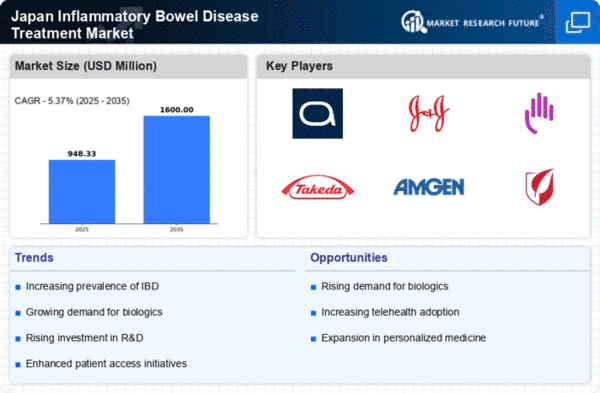Rising Healthcare Expenditure
The increase in healthcare expenditure in Japan is a significant driver for the inflammatory bowel-disease-treatment market. As the government and private sectors allocate more funds towards healthcare, there is a corresponding rise in the availability of advanced treatment options for chronic diseases like IBD. Recent reports indicate that Japan's healthcare spending is projected to reach approximately ¥50 trillion by 2026, reflecting a commitment to improving health outcomes. This financial investment facilitates the development and accessibility of innovative therapies, including biologics and personalized medicine. Moreover, as patients gain better access to healthcare services, the demand for effective IBD treatments is likely to surge. Consequently, the rising healthcare expenditure is expected to positively impact the growth trajectory of the inflammatory bowel-disease-treatment market.
Growing Awareness and Education
The increasing awareness and education surrounding inflammatory bowel disease are driving growth in the inflammatory bowel-disease-treatment market. Healthcare professionals and patients are becoming more informed about the symptoms, diagnosis, and treatment options for IBD. This heightened awareness is leading to earlier diagnosis and treatment, which is crucial for managing the disease effectively. Educational campaigns and support groups are playing a vital role in disseminating information, thereby empowering patients to seek medical help sooner. Market data indicates that early intervention can significantly improve patient outcomes, which in turn is likely to increase the demand for treatments. As awareness continues to grow, the inflammatory bowel-disease-treatment market is expected to expand, with more patients seeking effective therapies.
Government Initiatives and Support
Government initiatives aimed at improving healthcare access and treatment options are pivotal for the inflammatory bowel-disease-treatment market. In Japan, the government has implemented various policies to enhance the management of chronic diseases, including IBD. These initiatives often include funding for research, subsidies for innovative treatments, and public health campaigns to raise awareness about IBD. For example, the Japanese Ministry of Health has allocated substantial resources to support clinical trials and the development of new therapies. Such government backing not only fosters innovation but also encourages pharmaceutical companies to invest in the inflammatory bowel-disease-treatment market. As a result, the supportive regulatory environment is likely to facilitate the introduction of new treatments and improve patient outcomes.
Advancements in Treatment Modalities
Technological advancements in treatment modalities are significantly influencing the inflammatory bowel-disease-treatment market. The introduction of novel therapies, such as biologics and targeted therapies, has transformed the management of IBD in Japan. For instance, the approval of new biologic agents has expanded treatment options for patients, leading to improved outcomes and quality of life. Market data suggests that the biologics segment is projected to account for over 40% of the total market share by 2026. Additionally, the development of oral formulations and less invasive treatment options is likely to enhance patient adherence and satisfaction. These advancements not only provide healthcare professionals with more tools to manage IBD effectively but also contribute to the overall growth of the inflammatory bowel-disease-treatment market.
Increasing Prevalence of Inflammatory Bowel Disease
The rising incidence of inflammatory bowel disease (IBD) in Japan is a crucial driver for the inflammatory bowel-disease-treatment market. Recent studies indicate that the prevalence of IBD has increased significantly, with estimates suggesting that approximately 0.5% of the Japanese population is affected. This growing patient population necessitates the development and availability of effective treatment options, thereby stimulating market growth. As healthcare providers seek to address this increasing burden, the demand for innovative therapies, including biologics and small molecules, is likely to rise. Furthermore, the aging population in Japan, which is more susceptible to chronic diseases, may further exacerbate the situation, leading to an expanded market for IBD treatments. Consequently, the increasing prevalence of IBD is expected to drive investments in research and development within the inflammatory bowel-disease-treatment market.






















Leave a Comment